人教版英语初中九年级上册知识讲解,巩固练习(教学资料,补习资料)Unit 1 How can we become good learners. Section A
文档属性
| 名称 | 人教版英语初中九年级上册知识讲解,巩固练习(教学资料,补习资料)Unit 1 How can we become good learners. Section A | 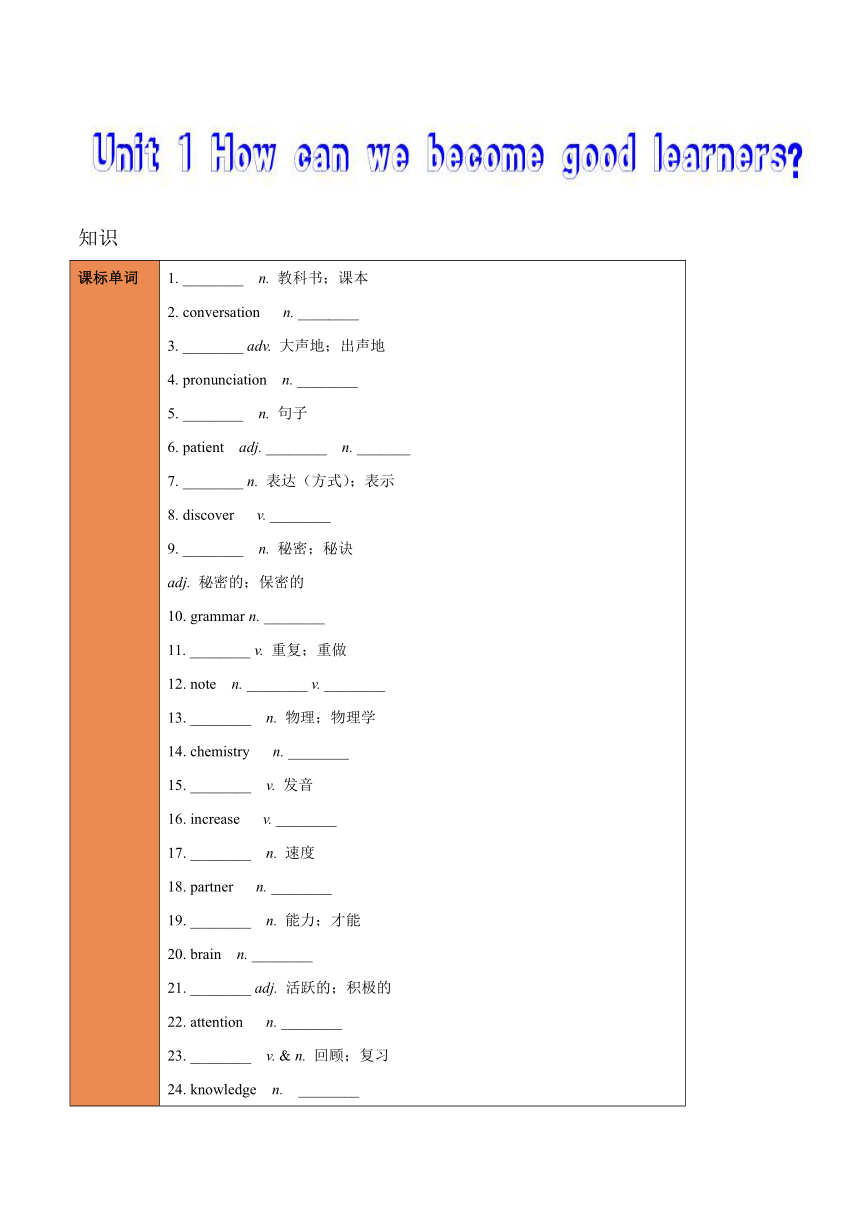 | |
| 格式 | zip | ||
| 文件大小 | 174.9KB | ||
| 资源类型 | 教案 | ||
| 版本资源 | 人教新目标(Go for it)版 | ||
| 科目 | 英语 | ||
| 更新时间 | 2019-09-13 17:53:09 | ||
图片预览

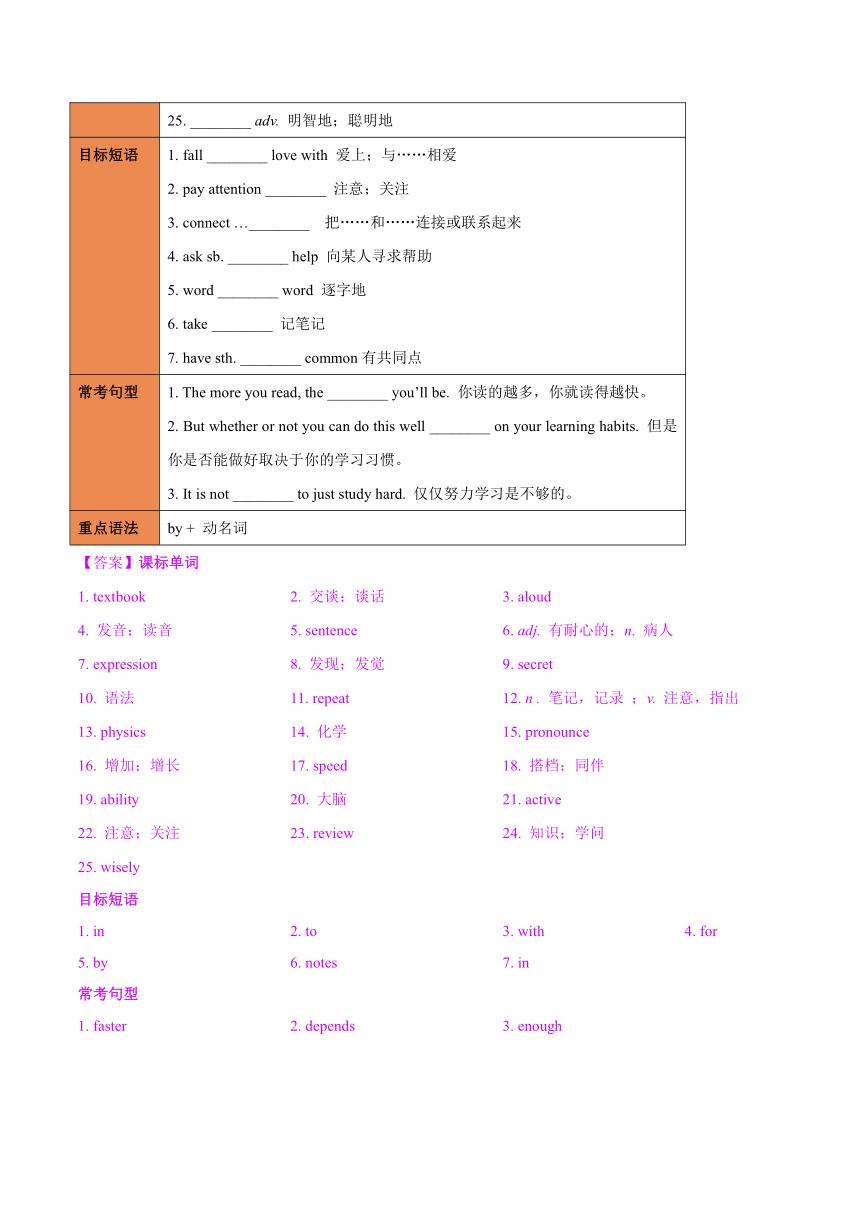
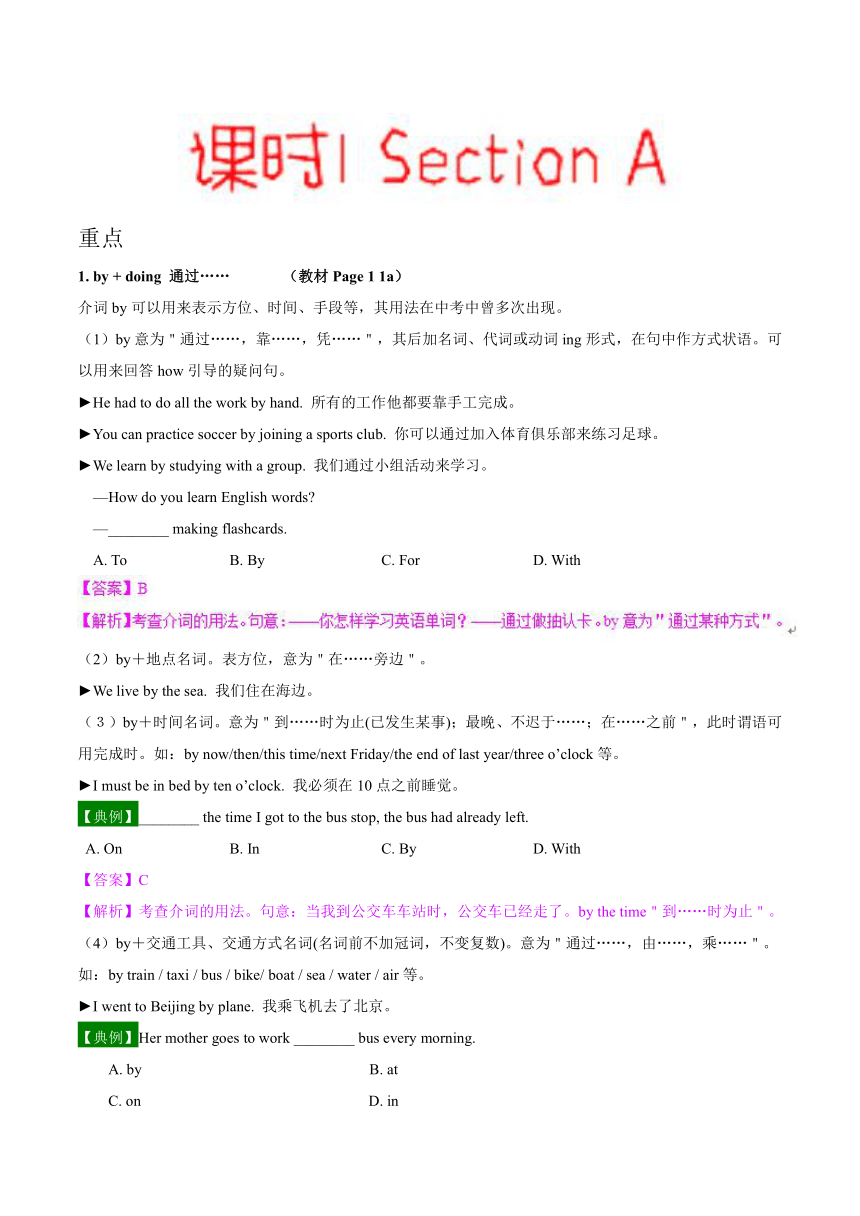
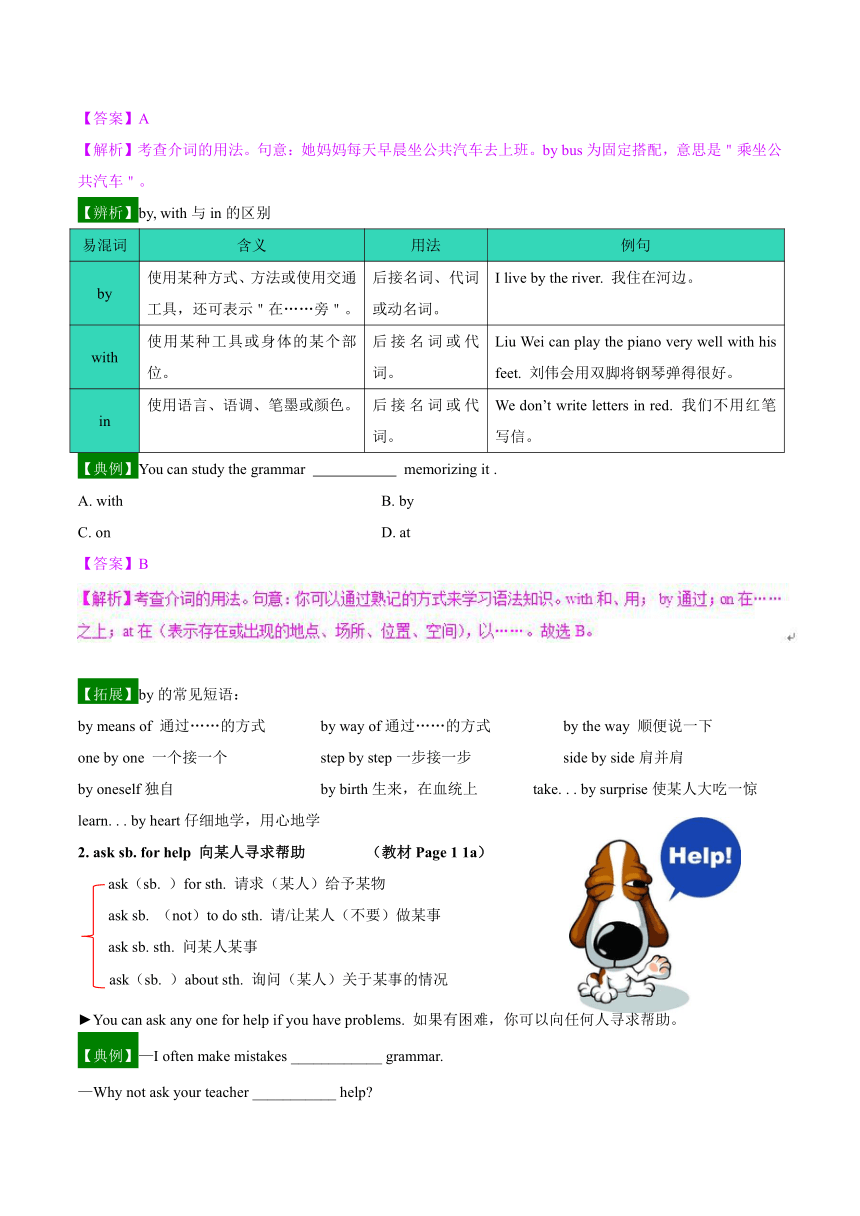
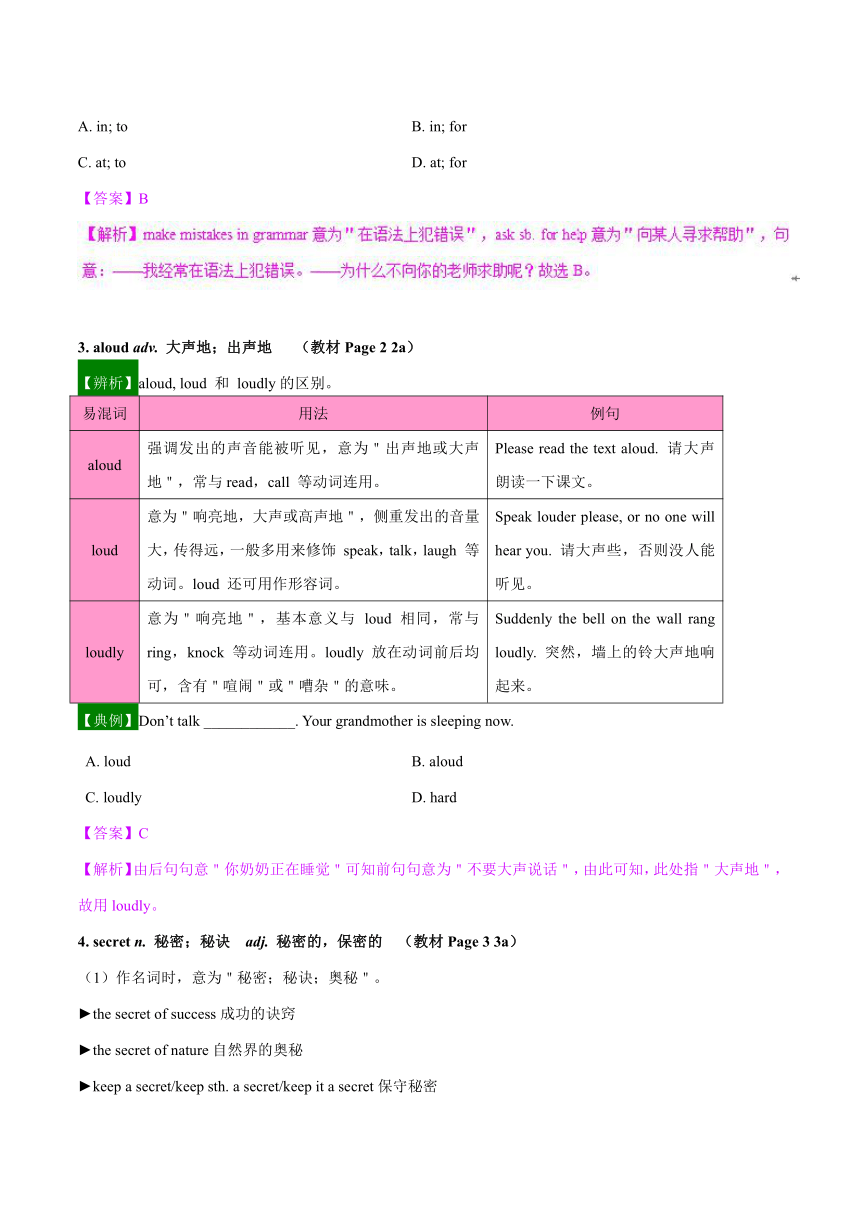
文档简介
知识
课标单词
1. ________ n. 教科书;课本
2. conversation n. ________
3. ________ adv. 大声地;出声地
4. pronunciation n. ________
5. ________ n. 句子
6. patient adj. ________ n. _______
7. ________ n. 表达(方式);表示
8. discover v. ________
9. ________ n. 秘密;秘诀
adj. 秘密的;保密的
10. grammar n. ________
11. ________ v. 重复;重做
12. note n. ________ v. ________
13. ________ n. 物理;物理学
14. chemistry n. ________
15. ________ v. 发音
16. increase v. ________
17. ________ n. 速度
18. partner n. ________
19. ________ n. 能力;才能
20. brain n. ________
21. ________ adj. 活跃的;积极的
22. attention n. ________
23. ________ v. & n. 回顾;复习
24. knowledge n. ________
25. ________ adv. 明智地;聪明地
目标短语
1. fall ________ love with 爱上;与……相爱
2. pay attention ________ 注意;关注
3. connect …________ 把……和……连接或联系起来
4. ask sb. ________ help 向某人寻求帮助
5. word ________ word 逐字地
6. take ________ 记笔记
7. have sth. ________ common有共同点
常考句型
1. The more you read, the ________ you’ll be. 你读的越多,你就读得越快。
2. But whether or not you can do this well ________ on your learning habits. 但是你是否能做好取决于你的学习习惯。
3. It is not ________ to just study hard. 仅仅努力学习是不够的。
重点语法
by + 动名词
【答案】课标单词
1. textbook 2. 交谈;谈话 3. aloud
4. 发音;读音 5. sentence 6. adj. 有耐心的;n. 病人
7. expression 8. 发现;发觉 9. secret
10. 语法 11. repeat 12. n . 笔记,记录 ;v. 注意,指出
13. physics 14. 化学 15. pronounce
16. 增加;增长 17. speed 18. 搭档;同伴
19. ability 20. 大脑 21. active
22. 注意;关注 23. review 24. 知识;学问
25. wisely
目标短语
1. in 2. to 3. with 4. for
5. by 6. notes 7. in
常考句型
1. faster 2. depends 3. enough
重点
1. by + doing 通过…… (教材Page 1 1a)
介词by可以用来表示方位、时间、手段等,其用法在中考中曾多次出现。
(1)by意为"通过……,靠……,凭……",其后加名词、代词或动词 ing形式,在句中作方式状语。可以用来回答how引导的疑问句。
?He had to do all the work by hand. 所有的工作他都要靠手工完成。
?You can practice soccer by joining a sports club. 你可以通过加入体育俱乐部来练习足球。
?We learn by studying with a group. 我们通过小组活动来学习。
—How do you learn English words?
—________ making flashcards.
A. To B. By C. For D. With
(2)by+地点名词。表方位,意为"在……旁边"。
?We live by the sea. 我们住在海边。
(3)by+时间名词。意为"到……时为止(已发生某事);最晚、不迟于……;在……之前",此时谓语可用完成时。如:by now/then/this time/next Friday/the end of last year/three o’clock等。
?I must be in bed by ten o’clock. 我必须在10点之前睡觉。
【典例】________ the time I got to the bus stop, the bus had already left.
A. On B. In C. By D. With
【答案】C
【解析】考查介词的用法。句意:当我到公交车车站时,公交车已经走了。by the time"到……时为止"。
(4)by+交通工具、交通方式名词(名词前不加冠词,不变复数)。意为"通过……,由……,乘……"。
如:by train / taxi / bus / bike/ boat / sea / water / air等。
?I went to Beijing by plane. 我乘飞机去了北京。
【典例】Her mother goes to work ________ bus every morning.
A. by B. at
C. on D. in
【答案】A
【解析】考查介词的用法。句意:她妈妈每天早晨坐公共汽车去上班。by bus为固定搭配,意思是"乘坐公共汽车"。
【辨析】by, with与in的区别
易混词
含义
用法
例句
by
使用某种方式、方法或使用交通工具,还可表示"在……旁"。
后接名词、代词或动名词。
I live by the river. 我住在河边。
with
使用某种工具或身体的某个部位。
后接名词或代词。
Liu Wei can play the piano very well with his feet. 刘伟会用双脚将钢琴弹得很好。
in
使用语言、语调、笔墨或颜色。
后接名词或代词。
We don’t write letters in red. 我们不用红笔写信。
【典例】You can study the grammar memorizing it .
A. with B. by
C. on D. at
【答案】B
【拓展】by的常见短语:
by means of 通过……的方式 by way of通过……的方式 by the way 顺便说一下
one by one 一个接一个 step by step一步接一步 side by side肩并肩
by oneself独自 by birth生来,在血统上 take. . . by surprise使某人大吃一惊
learn. . . by heart仔细地学,用心地学
2. ask sb. for help 向某人寻求帮助 (教材Page 1 1a)
ask(sb. )for sth. 请求(某人)给予某物
ask sb. (not)to do sth. 请/让某人(不要)做某事
ask sb. sth. 问某人某事
ask(sb. )about sth. 询问(某人)关于某事的情况
?You can ask any one for help if you have problems. 如果有困难,你可以向任何人寻求帮助。
【典例】—I often make mistakes ____________ grammar.
—Why not ask your teacher ___________ help?
A. in; to B. in; for
C. at; to D. at; for
【答案】B
3. aloud adv. 大声地;出声地 (教材Page 2 2a)
【辨析】aloud, loud 和 loudly的区别。
易混词
用法
例句
aloud
强调发出的声音能被听见,意为"出声地或大声地",常与read,call 等动词连用。
Please read the text aloud. 请大声朗读一下课文。
loud
意为"响亮地,大声或高声地",侧重发出的音量大,传得远,一般多用来修饰 speak,talk,laugh 等动词。loud 还可用作形容词。
Speak louder please, or no one will hear you. 请大声些,否则没人能听见。
loudly
意为"响亮地",基本意义与 loud 相同,常与 ring,knock 等动词连用。loudly 放在动词前后均可,含有"喧闹"或"嘈杂"的意味。
Suddenly the bell on the wall rang loudly. 突然,墙上的铃大声地响起来。
【典例】Don’t talk ____________. Your grandmother is sleeping now.
A. loud B. aloud
C. loudly D. hard
【答案】C
【解析】由后句句意"你奶奶正在睡觉"可知前句句意为"不要大声说话",由此可知,此处指"大声地",故用loudly。
4. secret n. 秘密;秘诀 adj. 秘密的,保密的 (教材Page 3 3a)
(1)作名词时,意为"秘密;秘诀;奥秘"。
?the secret of success成功的诀窍
?the secret of nature自然界的奥秘
?keep a secret/keep sth. a secret/keep it a secret保守秘密
?in secret秘密地,暗中;私下里
(2)作形容词时,意为"秘密的,保密的"。
?a secret door 暗门
【典例】—Tommy, you can never let others know what I have told you today.
—Don’t worry. I will keep the ____________.
A. secret B. money
C. address D. grade
【答案】A
5. afraid adj. 害怕的,怕的 (教材Page 3 3a)
【用法】① be afraid of sth. /doing sth. 害怕某物/做某事
② be afraid to do sth. 害怕做某事
③ be afraid that +从句 害怕……
?Don’t be afraid of snakes. 别怕蛇。
?It seems that she is afraid to tell them about it. 似乎她怕将此事告诉他们。
?She was afraid that she might lose her job. 她担心会丢掉工作。
还可用于提出异议,告诉不好的消息等场合,使语气婉转,意为"恐怕,遗憾"。
?I’m afraid I can’t help you. 对不起,我不能帮你。
【典例】Jenny used to be afraid to ___________ in class, so she always ___________ nothing.
A. speak; say B. speak; said C. spoke; say
【答案】B
【解析】be afraid to do sth. 害怕做某事,由"used to"可知此句应用一般过去时,故选B。
6. What about listening to tapes?听听磁带怎么样呢?
What about. . . ? 意为"……怎么样?",相当于How about…?,about是介词,后面跟名词、代词或动名词。
【拓展】表示建议的句型还有:
①Why don’t you…?
②Why not…?
③Would you mind…?
④Could you please…?
7. It’s too hard to understand spoken English. 这太难了,而理解不了口语。
too. . . to. . . 表示"太……而不能……",此结构本身具有否定的含义,相当于not. . . enough to. . . 。
spoken是speak的形容词形式,意思是"口语的",作定语,修饰English。
8. The more you read, the faster you’ll be. 读得越多就会变得越快。
"the +比较级…,the+比较级…",表示"越……越……"。
?The harder you work, the greater progress you will make. 你越用功,进步就越大。
9. The teacher spoke so quickly that I did not understand her most of the time.
so. . . that. . . 引导结果状语从句,从句中表示主句导致的结果。
so that引导目的状语从句,从句中一般有表示"能够"的词出现。
?She studies hard so that she can go to college. 她努力学习为了能够上大学。
10. I discovered that listening to something interesting is the secret to language learning.
listening to something interesting在宾语从句中作主语,使用动名词形式,谓语动词使用单数形式。
something是不定代词,形容词interesting修饰不定代词时要放在不定代词的后面。
基础训练
一、单项选择。
1. —When will the railway that connects the two cities open?
—___________ next year. Only two thirds ___________ been built.
A. Until; has B. Until; have C. Not until; has D. Not until; have
2. —May we leave the classroom now?
—No, you ___________. You ___________ to leave until the bell rings.
A. can’t; are allowed B. mustn’t; aren’t allowed
C. needn’t; are allowed D. needn’t; aren’t allowed
3. —Jieyang Chaoshan Airport, please. I have to get there before 7.
—___________, sir, but I’ll try my best.
A. Sorry, I can’t B. I can’t promise C. Yes D. No problem
4. —Have you found your lost pen?
—No, I haven’t found ___________, but I bought a new ___________ this morning.
A. one, that B. that, one C. it, one D. one, it
5. We are covering these ___________ girls’ wonderful performances ___________.
A. alive; live B. lively; alive C. lively; live D. alive; living
6. When the man went through the forest alone, he lost his ___________ and felt afraid.
A. task B. work C. way D. job
7. —Do you know anything about Song Joong-ki, ___________ famous actor from South Korea?
—Yes. He has lots of talentand he can even speak German as ___________ third language.
A. the; the B. a; the C. the; the D. a; a
8. —Bill, can I get you anything to drink?
—___________.
A. You are welcome. B. No problem
C. I won’t mind a cup of coffee. D. It doesn’t matter.
9. Tom, would you please pass the glasses to me? I can ___________ see anything on the blackboard.
A. quietly B. quickly C. hardly D. easily
10. —John is so excited. Did he win the competition?
—Yes. He was lucky and he had ___________ one minute to complete the special task, no more and no less.
A. especially B. probably C. exactly D. hardly
二、句型转换。
1. The box is too heavy for me to carry. (同义句)
The box is ___________ heavy ___________ I can’t carry it.
2. My brother usually studies English by working with friends. (划线部分提问)
___________ ___________ your brother usually study English?
3. What about reading aloud to practice pronunciation? (同义句)
___________ ___________ read aloud to practice pronunciation?
4. I have learned English for 5 years. (变成一般疑问句)
___________ you ___________ English for 5 years?
5. The boy does his homework at home every day. (否定句)
The boy ___________ ___________ his homework at home every day.
三、填写适当的单词补全句子。
根据句意及首字母提示括号中所给单词的正确形式填空,使句子意思完整、语法正确,每空一词。
1. People use dogs to help find things because dogs have a very good s________ of smell.
2. Jack a_________ a concert yesterday and it was wonderful.
3. —What is the noise?
—There must be someone k__________ at the door.
4. He p_______ coffee to tea. His favorite is coffee.
5. In her s_________ time, she likes playing chess with others.
6. The clothes may be one of the ___________. (pioneer)
7. I want to be a teacher in the future because I like to see so many ___________ children. (live)
8. The sun gives us light and ___________. (hot)
9. He spends as much time as he can ___________ speaking French every day. (practice)
10. He failed the exam because of his ___________. (careless)
能力测试
一、完形填空。
One day, a farmer was walking along a road with his son Thomas when they saw a horseshoe(马蹄铁)on the ground. The father said to his son, "Look at the horseshoe on the ground. Go and 1 the horseshoe and put it in your bag, my son. " But Thomas said, "If I do so, it will waste my time. " His father said nothing but picked it up himself. When they 2 a nearby town, they had a rest. There the farmer sold the horseshoe and 3 some strawberries with the money.
The father and the son went on walking. The sun was well up in the 4 . They soon drank up all their water and there was not a house or even a tree for them to have a rest. Thomas felt 5 thirsty to walk on. At this time, his father gave him a strawberry and he quickly ate it. After a while, his father gave him 6 strawberry and once again, his son got it quickly and put it in his mouth.
And so they 7 . The old farmer gave the strawberries and the son ate them. When Thomas had eaten up all the strawberries, his father said to him, "My dear son, 8 you picked up that horseshoe, you would have your own 9 to eat. Always remember the lesson: if you don’t worry about the little things, you will find it difficult 10 the great things.
1. A. give up B. put up C. pick up D. take up
2. A. got on B. got to C. got off D. got down
3. A. threw B. bought C. sold D. found
4. A. sky B. sea C. river D. ground
5. A. so B. very C. quite D. too
6. A. another B. other C. else D. the other
7. A. carried on B. turned on C. went on D. worked on
8. A. Or B. If C. Unless D. Until
9. A. water B. money C. horseshoe D. strawberries
10. A. to do B. to use C. to eat D. to drink
二、阅读理解。
A
When was the last time you saw three men running down a forest trail(小径)in the rain wearing flip-flops(拖鞋)? That’s what my friend Brandon, Josh and I were doing last autumn. We were looking for a waterfall. We didn’t have much time to get to the waterfall and back, so we were running. We were wearing flip-flops to prevent our shoes getting dirty.
It was raining, but lightly. It kept us cool as we climbed over giant stones and through a shallow stream. We followed red arrows and crossed that stream several times, walking on toward the promised waterfall. Time was not on our side, however, and we were forced to turn around. As we started back, we looked at the shallow stream we had just crossed. Where did this rushing river come from? That was when we realized a flash flood was around!
In the few minutes the water rose at a fast speed. Now there were no big stones to be seen-only what looked like lumps(隆起)covered with rushing water. We had no choice but to move our way back carefully in the rushing water-in flip-flops. We had crossed the stream not once or twice, but six times in search of a waterfall that we never even reached!
With most of the crossings, we needed each other’s help if we didn’t want to be washed away by water. Wet all over, we felt relaxed after we made the last crossing.
"My dad always told me to keep off a river when travelling in the rain." Josh said as we hurried back down the path.
"Why didn’t you tell us that earlier?" I laughed.
"Would it have made a difference?" came the reply.
He had a point.
1. Why were there no big stones to be seen in the stream when they came back?
A. The big stones were moved away by someone else.
B. They were running too fast to notice the big stones.
C. The big stones were covered with rushing water.
D. The big stones were washed away by rushing water.
2. Why didn’t they find the waterfall in the end?
A. Because they were short of time.
B. Because they were wearing flip-flops.
C. Because Josh kept warning them not to go any further.
D. Because the flood prevented them from going forward.
3. We can infer(推断)from the passage that the writer and his friends _________.
A. were crazy about outdoor activities
B. made full preparations before the trip
C. crossed rushing water easily in the end
D. had much experience in travelling in the rain
B
It is most difficult for parents to decide whether to have a second child or not.
It is often heard that a single child is like to be a lonely child. There are no other children in the family for the child to talk or play with. An only child is not able to get along well with children of his age. Some parents regretted making the decisions to have only one child.
But the number of parents choosing to have only one child is increasing in many parts of the world. In the US, for example, more than 14 percent of women between 18 and 34 plan to have just one child. The same can be seen in the UK. In Japan, the average number of children born per family had gone down to 1. 42 by 1996.
For some single-child parents, especially who are busy working every day, time and energy seem to beoverwhelming. They don’t have enough time and energy to share with more children. For other people, money is their first consideration. Many couples in Japan choose not to have large families as the cost of supporting a child up to the age of 18 reaches around US$160,000.
4. According to the passage, why is a single child likely to be lonely?
A. Because his parents don’t love him.
B. Because he doesn’t have holidays.
C. Because he doesn’t have a brother or a sister to talk or play with.
D. Because there are other children in the family.
5. What do people not think about when they choose to have a second child?
A. time B. energy C. money D. food
6. What does the underlined word "overwhelming" mean in the last paragraph?
A. 压倒一切的 B. 宽松的 C. 流行的 D. 充足的
7. Which of the following is true according to the passage?
A. It is not easy to make a decision to have a second child.
B. Many couples in Japan love to have large families.
C. All parents feel confident(自信的) about having a second child.
D. Less than 14% of women in the UK plan to have just one child.
8. Parents choose not to have a second child because
A. The cost of supporting a child is so high.
B. Parents are too busy working every day to share their time and energy with more children.
C. Some parents regretted making the decisions to have only one child.
D. Both A and B.
三、填写适当的句子补全对话。
A: Jim, you said you would not stay out late after school, didn’t you ?
B: 1. __________________
A: But it’s 10 o’clock now. 2. _______________?
B: Sorry, I’ve been to the hospital.
A: What? 3. _______________
B: No. I sent Jack to the hospital.
A: Oh, really? What was wrong with him?
B: He had a terrible headache on the way home.
A: 4. ______________
B: Yes, he is.
A: Good for you, my dear! I’m very glad you can help others.
B: 5. _____________
A. Were you sick?
B. Yes, mom, I did.
C. Is he better now?
D. Thank you, mom.
E. Where have you been?
四、语法填空。
call, way, well, poor, remember, never, how, easy, realize, difference
Today I was so happy to know that I did quite 1 in my last week’s science exam. Thanks to Daniel, he taught me a new way of going over lessons. It is 2 "map idea. "
Because of the map idea, I’ve learned 3 to find out the main idea of every lesson. And in my mind I can draw a map of all the important knowledge I need to 4 . It’s really good. I can remember so much in that 5 .
I had 6 thought of changing the way of my study before. I was always complaining about my 7 Memory, but now my memory has become good because of the map idea. It has made my study much 8 and more enjoyable. I have 9 finding a good way to study is really important.
In fact, there are many good ways to study and 10 people may need different ways. If we find out the best way for us, I think we all can study well.
真题练习
1. (重庆市2019年中考)The cake __________ delicious. I’d like to have another one.
A. tastes B. looks C. sounds D. feels
2. (四川省乐山市2018年中考)The program I’m a singer is quite popular __________ students these days. They often talk about it between classes.
A. for B. with C. in
3.(2019年四川宜宾中考)My sister __________ be lazy. But now she’s working really hard.
A. used to B. is used to C. was used to
参考答案
基础训练
一、单项选择。
1. C【解析】考查连词和动词。句意:——连接这两座城市的铁路什么时候开通?——明年才开通。这段铁路只修了三分之二。until 直到……时候;根据句意可知,直到明年铁路才能开通,因此应该用否定形式not until,直到……时候,才……;第二个空前的主语是two thirds,意思是三分之二的铁路,railway是单数形式,故动词也应该用单数,故选C。
2. B【解析】考查情态动词及连词辨析。句意:——我们现在可以离开教室了吗?——不,不行。打铃才允许你们离开。can’t不能;mustn’t不准,不允许,禁止;needn’t不必;本题强调打铃才离开,因此禁止现在离开,用mustn’t;后句是not...until...直到……才……结构。故选B。
4. C【解析】考查代词的用法。句意:——你找到你丢失的钢笔了吗?——没有,我没有找到它,但是我今天上午买了个新的。it 指代上文中的同一事物,one指代同类事物中的一个。结合句意,可知第一空指代上文中的钢笔,第二空指代钢笔中的一个,故选C。
5. C【解析】句意:我们正在现场报道这些活泼的女孩精彩的表演。第一空修饰名词女孩儿,应用形容词,alive是表语形容词,一般不作定语,修饰名词,故排除A,D;第二空修饰整个句子,应用副词,故排除B,live在这里作副词,意思是"实况转播地,现场直播地"。
6. C【解析】考查名词词义辨析。句意:当那人独自通过森林时,他迷路了并且感到害怕。A. task任务;B. work工作;C. way路;D. job工作。在森林里独自一人,容易迷路。故选C。
7. D【解析】考查冠词的用法。句意:——你知道韩国著名演员宋钟基的事吗?——是的。他很有才华,他甚至可以讲德语作为第三语言。不定冠词a表示泛指,famous [‘fe?m?s]以辅音音素开头,故前面用不定冠词a;序数词前用不定冠词a表示"再一,又一"的意思。故答案为D。
8. C【解析】考查交际用语。句意:——比尔,我能给你拿点什么喝的吗?——要是不麻烦的话,我很想来杯咖啡。A. You are welcome. 欢迎,不客气。感谢的答语;B. No problem没问题,请求的答语; C. I won’t mind a cup of coffee. 要是不麻烦的话,我很想来杯咖啡;D. It doesn’t matter. 没关系,道歉的答语。结合语境可知选C。
9. C【解析】考查副词的用法。句意:汤姆,你能把眼镜递给我吗?我几乎看不清黑板上的任何东西。A. quietly 安静地;B. quickly快速的;C. hardly几乎不;D. easily容易的。根据句意故选C。
10. C【解析】考查副词的用法。句意:——约翰是如此的激动,他赢得了比赛吗?——是的,他是幸运的,并且他正好在最后的时刻完成了这份特殊的任务,时间不多也不少。A. especially尤其,特殊;B. probably可能;C. exactly恰好地,精确地 ;D. hardly几乎不。根据句意,故选C。
二、句型转换。
1. so; that 2. How does 3. Why not 4. Have; learned 5. doesn’t do
三、填写适当的单词补全句子。
1. sense 2. attended 3. knocking 4. prefers 5. spare
6. pioneers’ 7. lively 8. heat 9. practicing/practising 10. carelessness
能力测试
一、完形填空。
【文章大意】这篇短文主要通过农夫沿途用儿子不屑于捡的马蹄铁换来的钱买樱桃给儿子在路途上很渴却没水的时候吃的事例,教育其儿子:如果一个人对小事都不在意,那么他肯定也做不了大事。
1. C【解析】考查动词及语境的理解。 A. give up放弃;B. put up举起;C. pick up 捡起;D. take up开始学。句意:去捡起那块马蹄铁并且把它放进你的口袋里。结合句意,故选C。
4. A【解析】考查名词及语境的理解。A. sky 填空;B. sea海;C. river河流;D. ground地面。太阳高挂在天空。根据后文他们喝光了水,可知太阳高照,故选A。
5. D【解析】考查形容词及语境的理解。A. so所以;B. very非常;C. quite 相当;D. too太。托马斯感到太口渴而不能再行走了。too …to do sth. 太……而不能做某事。结合句意,故选D。
6. A【解析】考查形容词及语境的理解。A. another另一个;B. other 其他的;C. else别的;D. the other其他所有的。过了一会儿,他的父亲又给了他一个草莓。根据上文父亲已经给了他一个草莓,可知又给了他一个,故选A。
7. C【解析】考查动词及语境的理解。A. carried on 从事;B. turned on 打开;C. went on 继续;D. worked on从事。他们继续走。结合句意,故选C。
8. B【解析】考查连词及语境的理解。A. Or否则;B. If如果;C. Unless除非;D. Until直到。我亲爱的儿子,如果你捡起那个马蹄铁你会有你自己的草莓吃。结合句意,故选B。
9. D【解析】考查名词及语境的理解。A. water水;B. money 钱;C. horseshoe马掌;D. strawberries草莓。根据上下文可知父亲认为儿子如果捡起马蹄铁就会有自己的草莓吃。故选D。
10. A【解析】考查动词不定式及语境的理解。A. to do做;B. to use使用;C. to eat 吃;D. to drink喝。如果你不关心小事情,你就会发现做大事情是困难的。结合句意,故选A。
二、阅读理解。
A
文章大意:本文讲述的是作者和朋友一起寻找瀑布的故事。雨中沿着山间小径奔跑、渡过水面不断上涨的小溪,小伙伴们的互相协作帮助,混身湿透了,但是越来越大的水阻止着他们前行。
2. D【解析】细节理解题。题意:最后他们为什么没有找到瀑布?A. Because they were short of time. 因为他们没有时间;B. Because they were wearing flip-flops. 因为他们穿着拖鞋;C. Because Josh kept warning them not to go any further. 因为Josh不断地警告他们不要再前行;D. Because the flood prevented them from going forward. 因为洪水阻止他们向前。由第三段里的:Now there were no big stones to be seen-only what looked like lumps(隆起)covered with rushing water. We had no choice but to move our way back carefully in the rushing water -in flip-flops可知,由于水面上涨了,他们没有其他的选择,只有小心地在洪水中往回走。故选D。
3. D【解析】推理判断题。题意:从短文中我们可以推断出作者和朋友们什么?A. were crazy about outdoor activities对户外活动着迷;B. made full preparations before the trip在旅行前做好了充分准备;C. crossed rushing water easily in the end最后轻松地通过了流水;D. had much experience in travelling in the rain有许多在雨中旅行的经验。由第三段里的:We had crossed the stream not once or twice, but six times in search of a waterfall that we never even reached!可知作者和朋友们多次穿过小溪寻找瀑布,因此他们对于在雨中穿行,经验丰富。故选D。
B
文章大意:本文叙述了有的父母愿意生二胎,因为他们认为一个孩子太孤单。父母不选择生二胎的原因是:费用高和时间少。
4. C【解析】细节理解题。根据There are no other children in the family for the child to talk or play with. 可知,因为家庭里没有其他的孩子,这孩子没有和他谈话和可以玩儿的伙伴了,故选C。
5. D【解析】细节理解题。根据从文章中看在二胎问题上,父母考虑的没有"food"问题,可知,故选D。
8. D【解析】细节理解题。从文章来看,父母不选择生二胎的原因是:费用高和时间少。故选D。
三、填写适当的句子补全对话。
1—5 BEACD
四、语法填空。
【文章大意】这是一篇学法指导的短文,作者介绍了"思维导图"给自己学习带来的帮助和变化:学会了如何找出每一课的主题思想;可以画出我需要记住的所有重要知识;记忆力变得很好,使学习更容易、更愉快。可见,只要找到最好的方法,都能搞好学习。
1. well 2. called 3. how 4. remember 5. way
6. never 7. poor 8. easier 9. realized 10. Different
真题练习
1. A【解析】考查连系动词词义辨析。A. taste"尝起来";B. look"看起来";C. sound"听起来";D. feel"感觉;摸起来"。句意:这蛋糕 _______ 美味,我想再吃一块。根据cake是食物,应该是"尝起来"才行。故选A。
2. B【解析】句意:我现在是个歌手,这个节目很受学生欢迎。他们经常在课堂上谈论它。考查介词辨析题。be popular with在……中有声望/受好评,固定短语。根据句意语境,可知选B。
3. A【解析】句意:我妹妹过去常常很懒,但是现在她真的工作很努力。A. used to do过去常常做某事,B. is used to do被用来做某事(一般现在时态),C. was used to do被用来做某事(一般过去时态),根据But now she’s working really hard可知过去常常很懒;故选A。
同课章节目录
- Unit 1 How can we become good learners.
- Section A
- Section B
- Unit 2 I think that mooncakes are delicious!
- Section A
- Section B
- Unit 3 Could you please tell me where the restroom
- Section A
- Section B
- Unit 4 I used to be afraid of the dark.
- Section A
- Section B
- Unit 5 What are the shirts made of?
- Section A
- Section B
- Review of Units 1-5
- Unit 6 When was it invented?
- Section A
- Section B
- Unit 7 Teenagers should be allowed to choose their
- Section A
- Section B
- Unit 8 It must belong to Carla.
- Section A
- Section B
- Unit 9 I like music that I can dance to.
- Section A
- Section B
- Unit 10 You're supposed to shake hands.
- Section A
- Section B
- Review of Units 6-10
- Unit 11 Sad movies make me cry.
- Section A
- Section B
- Unit 12 Life is full of the unexpected
- Section A
- Section B
- Unit 13 We're trying to save the earth!
- Section A
- Section B
- Unit 14 I remember meeting all of you in Grade 7.
- Section A
- Section B
- Review of Units 11-14
